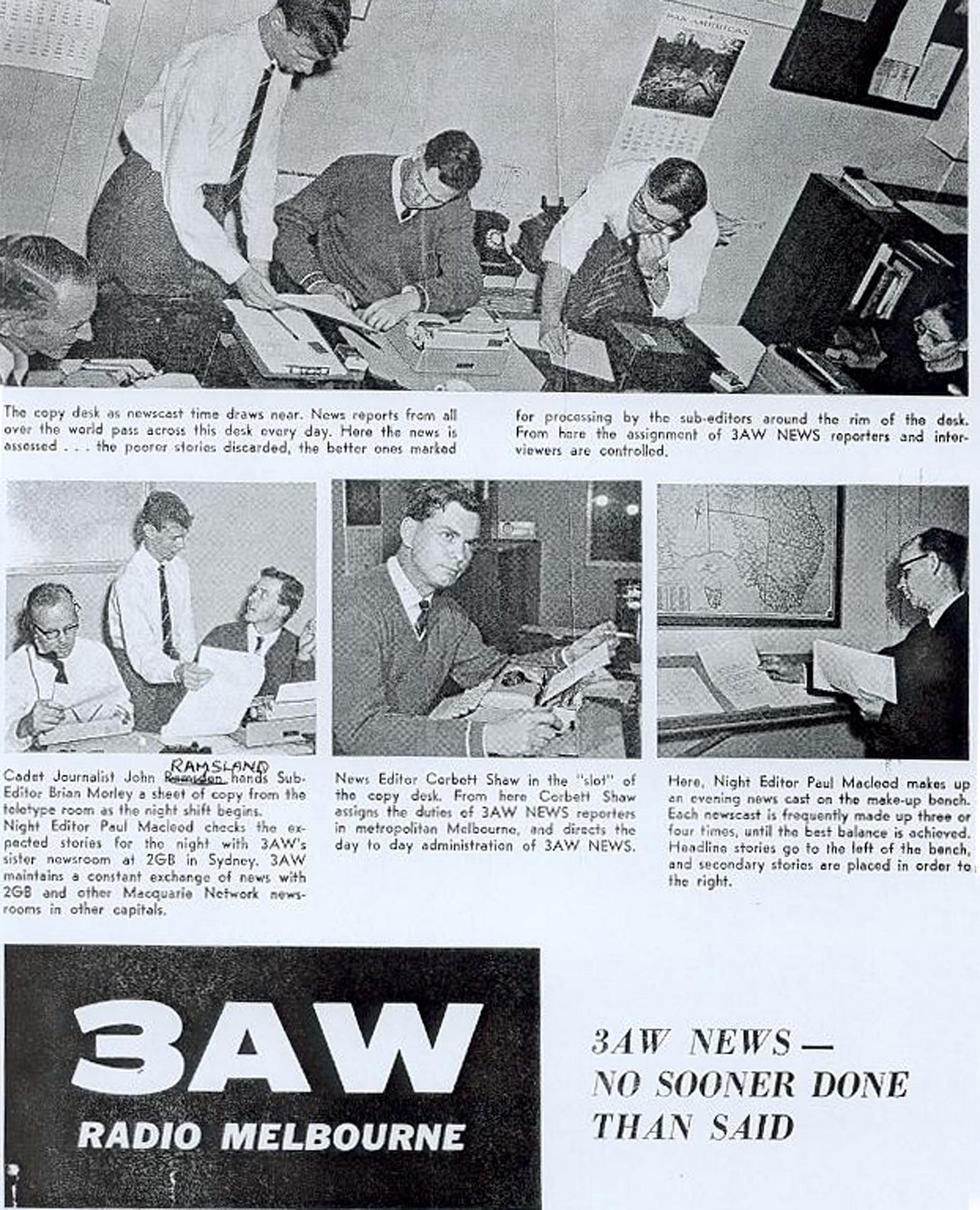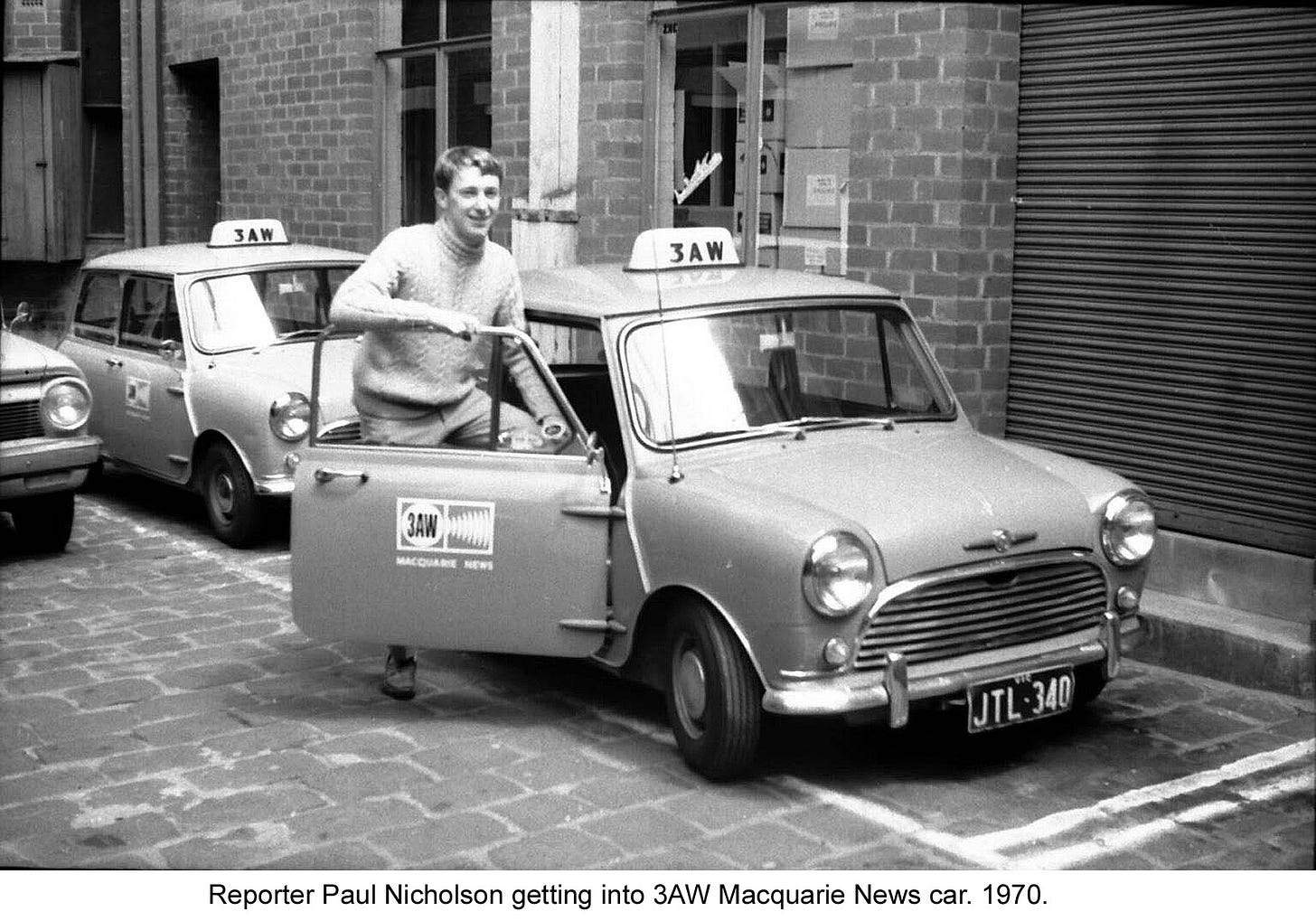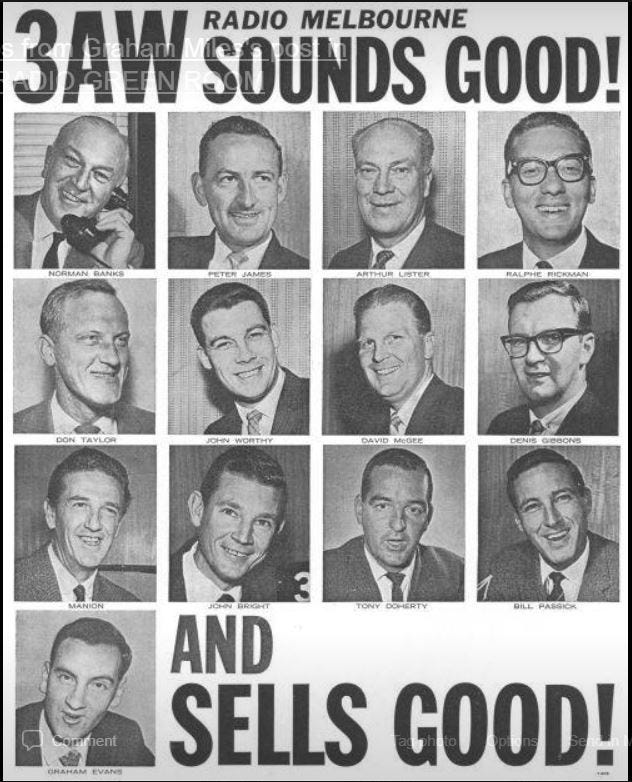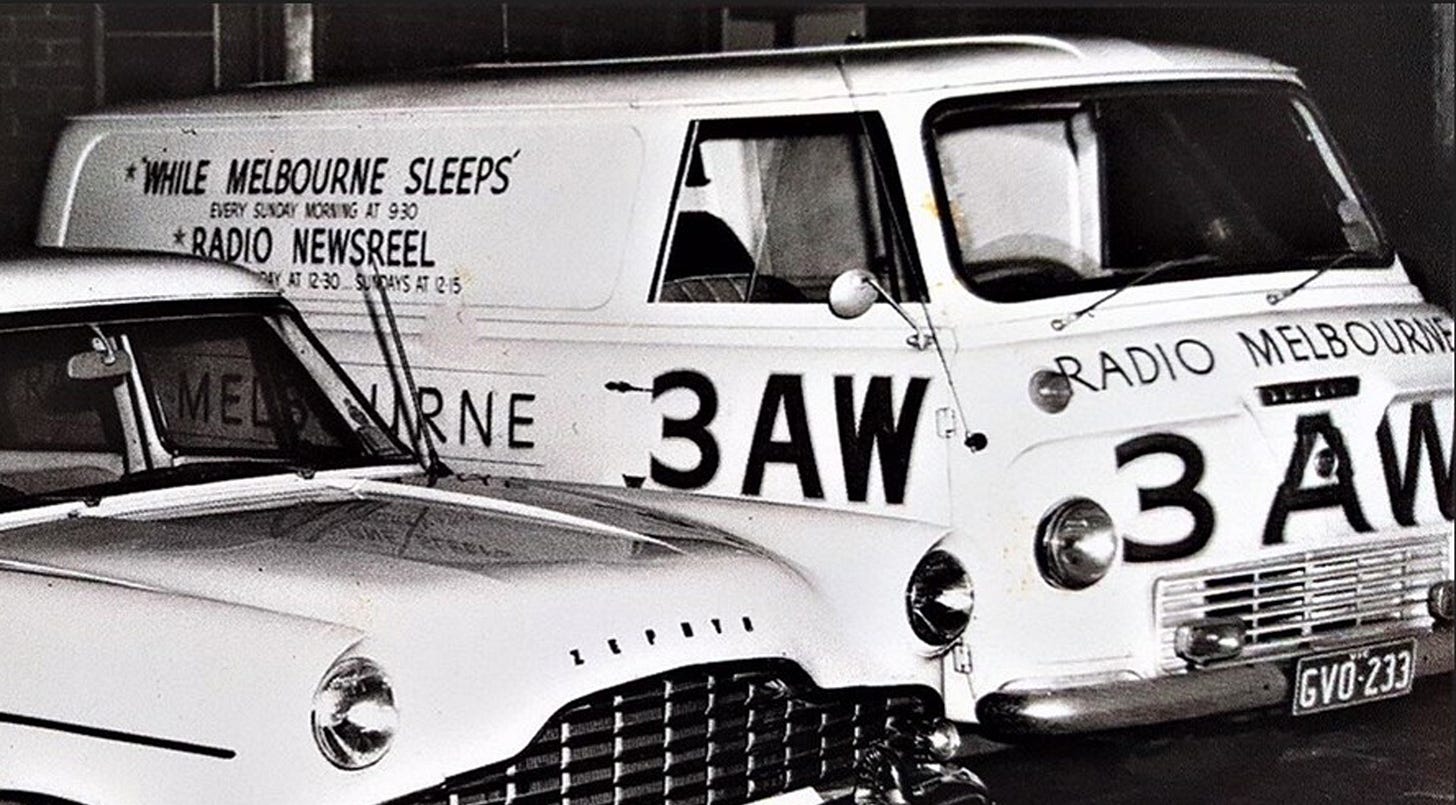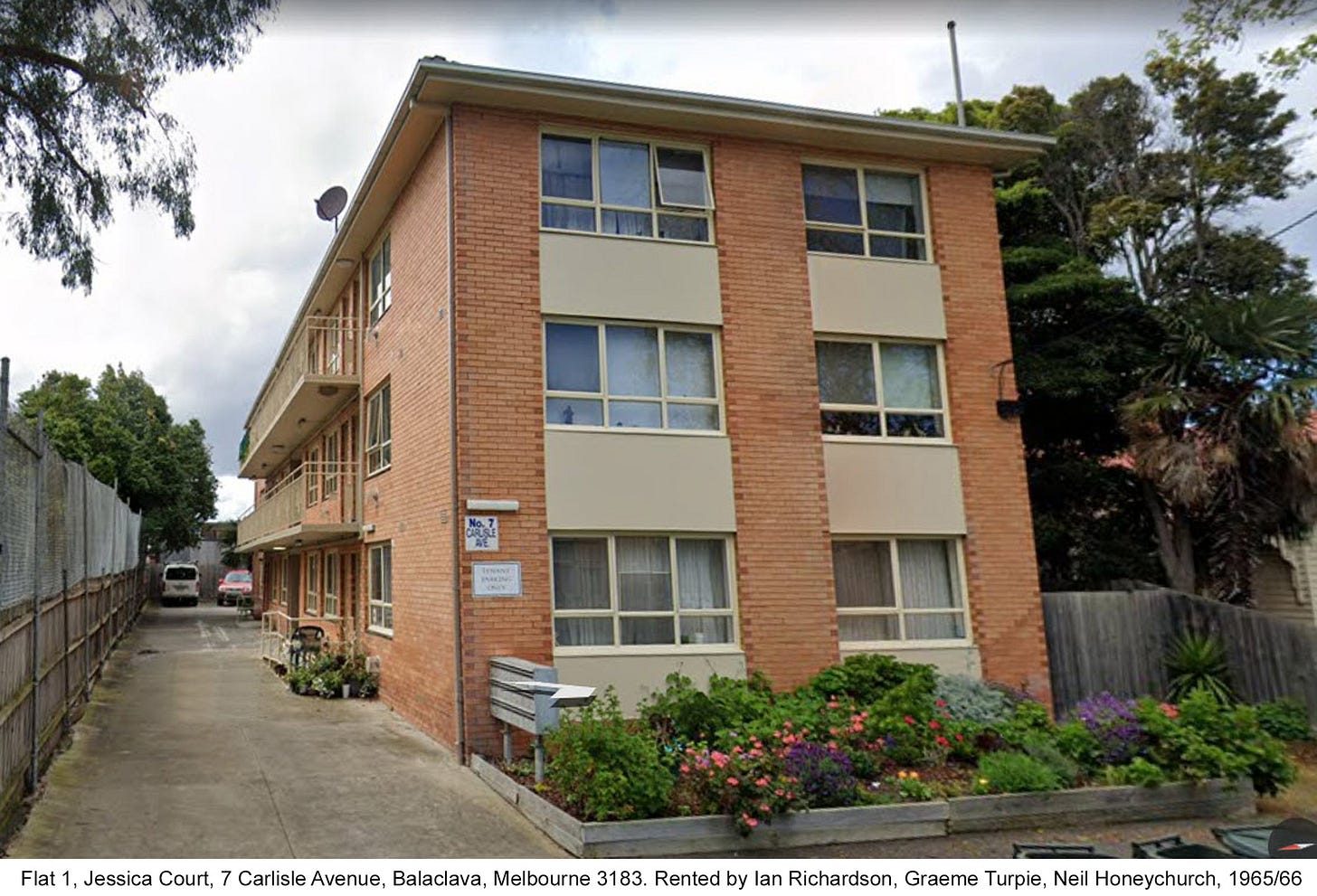Chapter 13: Life in a big city radio station
When I was with Radio 3BO Bendigo the newsroom editor David Horsfall and I would sometimes contribute stories to Radio Melbourne 3AW. Out of the blue, I was contacted by the 3AW news editor Corbett Shaw offering me a job. I was flattered, and a few weeks later, in April 1963, I found myself one of more than 20 journalists in the busiest and largest newsroom in Australian commercial radio.
It was a whole world away from what I had experienced at Radio 3BO. It had equipment I’d never seen before, and the competition with the rival radio stations in Melbourne was intense. Corbett was not interested in being second with a story. 3AW News had to be first and the best.
The advertisement below attracted a certain amount of ridicule. Most recently it has been pointed out that it referred to “the men behind the news”. What about the women? Those of us who happened to be around when the photo was taken were instructed that we must not smile. “We should make it clear we regarded news as a serious business,” we were told.
Corbett could be a ruthless boss, and it was only after I joined 3AW I learned that he had a reputation for hiring a journalist on Monday and firing them the following Friday if they didn’t come up to scratch. This was despite his being a supporter of the journalists’ union, the Australian Journalists’ Association.
One Saturday he discovered that his journalists were taking an extended lunch break at a nearby pub. He drove into the newsroom from his home in an outer suburb of Melbourne, fired the five journalists on duty and took over the shift himself. On another occasion, one of the journalists got rather pissed at the station’s Christmas party and said to Corbett “I suppose you’ll sack me in the morning”, which Corbett did. As you can imagine, there was often a high turnover of staff in the 3AW newsroom, but somehow I survived for five years until I resigned in 1968. (More on this later).
Corbett left school at 13, but that didn’t stop him rising to well-deserved heights in journalism. He joined 3AW from the Sydney Morning Herald and soon established an independent radio newsroom that attracted great respect among listeners. It was independent in the sense that it no longer received its news — often very slowly — from the Melbourne Age radio desk. By the time I joined 3AW, Corbett had set up Macquarie Newswire, providing a fast-moving radio news service by teleprinters and early fax machines to about 20 stations in Victoria and interstate. It is my belief that Corbett had the best understanding of writing for radio than any other broadcasting editor in Australia.
I don’t think I have since worked as hard as I did at 3AW, but I gained wonderful experience and it was fun most of the time. In addition to the three-minute bulletins on the hour — sometimes every half hour — there were two half-hour bulletins each weekday. These contained lots of audio inserts from around the world. One such bulletin went out at lunchtime and the other in the early evening. They became must-listen programs for many people, especially those in high places. If a big story broke, the scheduled output was interrupted. Such was the high status of 3AW News that few people in the news — no matter how important they were — would decline an offer of airtime.
Part of the reason 3AW news was so often ahead of the game was that we were able to listen to the fire brigade network and to the D24 radio transmissions from police headquarters. D24 was said to have got its name from once being behind Door 24 in the Russell Street Police Headquarters. Our monitors were illegal, but the police and fire service weren’t that bothered. They knew they were being monitored.
All of us had to learn the most important police call sign codes, such as the ones for a road accident with ambulances required, or for a suspicious death. And we needed to be alert to any major fires mentioned on the fire brigade channel.
There were occasions when the police and firemen (yes, they were all firemen back then) would use their radios to make announcements such as “Would the press please hold back a bit as we are facing a particularly dangerous situation. We’ll keep you informed as soon as the situation becomes safer.”
We were also able to tune into air traffic control should there be an emergency. I was on duty in April 1964 when an engine came partly adrift from a propellor-powered Ansett-ANA Douglas DC2 airliner as it took off from Melbourne’s Essendon Airport for Adelaide. The plane was unable to return to Essendon with one engine hanging off a wing, so it flew over Port Philip Bay. It climbed as high as it could then nose dived towards the water, trying to shake the engine completely free. It did this several times before it succeeded and all the time we were able to listen to the conversation between the pilot and the airport control tower — and do live reports — as the airliner returned safely to Essendon Airport. I can’t find a record of what the passengers thought of this experience, but it is safe to assume they weren’t enthusiastic.
Another important news gathering asset in the 1960s was the Sands and McDougall directory. This provided a street-by-street listing of house occupants in each Melbourne suburb, and later in country Victoria. It was back when most telephone numbers were listed in frequently-updated public Post Office directories. Thus if we heard the police or firemen had been called to, say, 50 Junction Avenue, Smithtown, we could immediately check the Sands and McDougall directory to discover the names of the neighbours. We would then look them up in the phone book and call them to see if they could tell us what was going on. Most people were thrilled to be contacted by 3AW and if they had anything special to report, were happy to be put on air live. If the story was big enough, a reporter in a 3AW radio car would shortly turn up to do interviews and live reports.
Another wonderful asset for news gathering was the press room in Police Headquarters. It was a very grubby area, occupied during peak periods by what were called “police roundsmen” working for the main news organisations. There was a constant flow of printed crime reports delivered to the press room. 3AW’s main police roundsman was Mal Cochrane who could be relied upon to never miss an important story.
We were the only commercial radio station with a political roundsman who operated out of Parliament House in Melbourne each weekday. He was Frank O’Brien, a most interesting and talented character, who reported politics Monday-to-Friday and called the horse races for the ABC on Saturdays. The national political news came from Frank Chamberlain in Canberra.
During the busiest parts of a day, 3AW always had at least one Morris Mini-Minor radio car on the road, ready to react to emergencies, or to cover more routine stories or to interview newsworthy people arriving at Essendon Airport.
My time with 3AW reunited me with DJs Tony Doherty and John Bright, last seen in Shepparton, Victoria, when they were at Radio 3SR and I was with the Shepparton News. (See Chapter 6) They were both great fun.
Here’s the on-air line-up when I was at 3AW:
Bill Passick and I initially had problems, but we became good friends once he understood that there would be consequences for him if he continued to ridicule me. David McGee was a true gentleman, always ready to constructively advise. Dennis Gibbons was the station’s practical joker (more on this in the next chapter).
Norman Banks was the station’s star performer with his daily talk-back program and his weekend football coverage. He was an exceptionally skilled broadcaster, but he was very right wing and thought there was nothing wrong in being the guest of the widely-reviled white South African Government. An edition of the ABC TV’s Four Corners denounced him as “the voice of Apartheid South Africa”.
Norman’s talkback program was often dominated by his attacks on the modern world, not least the contraceptive pill, mini skirts and marital infidelity. But he was a shocking hypocrite. He employed stunningly-beautiful secretaries with the shortest of skirts and there was persistent talk of his difficulty in resisting the temptations of young women. The Melbourne Truth newspaper blew the whistle on his claims of having a wonderful marriage by reporting that he was legally estranged from his wife, although living separately in their divided house.
I particularly liked John Worthy with his wonderfully rich voice and his skills as a newsreader and interviewer. For a time, he also produced and presented While Melbourne Sleeps, a program made overnight on Saturdays and broadcast on Sunday mornings. John would spend Saturday nights witnessing the dark side of Melbourne and monitoring the police and fire brigade channels. He had a bodyguard trained as a first aider. If, say, they arrived at the scene of a car crash with some injuries, the bodyguard/first aider would go to the injured persons and provide medical help. He would then tell John about the injuries. John might do live interviews with those involved in the crash, seeking their opinions about who was at fault. This was where he was often in need of bodyguard.
About 7am, John would return to 3AW to edit the program in time for its transmission at 9.30am. While Melbourne Sleeps was an entertaining program, although not always an uplifting one. I don’t think John regarded it as a highlight of his career. Still, he avoided the scandal that blew up about a predecessor, Des Telford, who was fired after doing a live broadcast in which he is reported to have said “You are now hearing the last gasps of a dying man”. Telford also had problems with the tax department and was last reported to be joining The Radio Voice of the Gospel, a widely-heard shortwave and medium wave station based in the Ethiopian city of Addis Ababa.
3AW News had four shifts, the worst one being from midnight to 9am. There was just one journalist on duty until 5am when the next team turned up to prepare the breakfast bulletins. The music and news programs between midnight and 6am were presented by a female working alone except for the duty journalist who read the news bulletins.
Although it was never publicly stated, the female presenters were chosen for their sultry voices, full of promise. Their looks were very much a secondary issue. One of the female presenters had fans in a local bakery and a tray of freshly-baked cakes would be delivered to the studios about 5am whenever she was on duty. She would offer an enthusiastic “thank you” on air, naming the bakery. No doubt the person delivering the cakes would have hoped to have them received by a glamourous female, but were told that the presenter could not leave the studio. This was, perhaps, just as well. The presenters often did not look their best in the early hours. They would often turn up for work in any old clothes and not bothering to wear make-up or do their hair.
There was one New Year’s eve when the station bosses thought it would be a great idea to have both female presenters on the one shift. It wasn’t. They arrived for work well oiled and when the duty journalist was reading the midnight bulletin, they leapt about the studio doing the can-can. Eventually, he corpsed (began laughing). Unfortunately, this was while reading a story about a fatal road accident in which the deceased was named. Bad enough, but worse was to come. Some of the deceased’s family were listening and had yet to be informed of the fatality. No surprise that the next morning there was a furious management inquest with a profuse apology having to be issued to the distraught and very angry family. The two female presenters were disciplined but escaped being dismissed. However, they were never to work together again.
Corbett Shaw always kept a close ear on the 3AW News output when at home. He would wake before 6am and listen to that bulletin. Next he would phone the newsroom to discuss the news prospects and likely headlines for the main breakfast bulletins. Then on weekdays he would have breakfast and drive to the studios with a cassette recorder taping the output. If there was a screw-up, he would call the guilty person into his office and play them the recording.
Corbett was a notorious chain smoker, as were several others in the newsroom. No surprise then that the newsroom was often filled with a fog of smoke and that desks were covered in ash. I was one of the few who didn’t smoke, having giving it up when I left school at 16 and decided it was no longer fun and naughty.
When I first arrived in Melbourne to take up the 3AW offer I had the good fortune to be offered a spare room in a lovely terraced house owned by Kevin Booth and occupied by him and my old schoolmate Ron Winsall.
Both Ron and Kevin were in the Victoria Police Observation Squad, informally referred to as the “dogs” or “shadowers”. It was their job to gather intelligence on the movement of prominent criminals in Victoria. They always wore civilian clothes and travelled in unmarked police cars. It was an interesting job, as they never knew where their target criminals would lead them. Later we were joined by 3AW cadet journalist, John Fraser, who had emigrated from his birthplace, Liverpool, in his late teens.
In 1965, Kevin resigned from the Victoria Police and moved to Sydney while Ron was transferred to Bendigo as a detective. I then moved to a modern flat in the suburb of Balaclava with a former 3BO colleague, Graeme Turpie, then with Radio Australia, and his bank teller cousin, Neil Honeychurch.
Living in Jessica Court was not without its problems. For a while, a couple of young women “on the game” had the flat above us. Each evening they would go off to the Navy Club in Melbourne, returning about midnight with their “clientele” for some partying and whatever went with it. The noise was very distracting, especially so for Graeme and me who worked shifts. We finally solved the problem by alerting the military police who closed down the women’s “business”.
Other unwelcome occupants of that flat were a (married?) couple who spent much of their time engaging in violent rows.
There was banging on our door one evening and Graeme and I were confronted by the drunken and very aggressive husband demanding that we move our cars because he wanted our parking spaces. We refused and eventually threatened to call the police. He then backed down saying “no need to call the police” and withdrew.
Next day he knocked on the door again. This time he was sober and full of apologies. We could continue to park where we were and he would park somewhere else. “No need to call the police,” he added.
It soon became clear why he didn’t want the police involved. We were contacted by detectives seeking our help in keeping a watch on the husband. They’d been warned that he was seeking a gun to carry out a robbery to raise the bail money for his son who had been arrested for a jewel theft. When a removal van turned up a couple of weeks or so later we alerted the police who followed them to their new address in another suburb of Melbourne. Excellent. Peace and quiet were restored to Jessica Court. Then came an unexpected development. I was on duty at 3AW when our police roundsman Mal Cochrane phoned to report news of a particularly nasty murder in which a man had killed his wife with a steel club hammer. Yep, you guessed it. It was our nasty former neighbour.
Next chapter: more fun and excitement at 3AW and elsewhere.
View the other chapters




